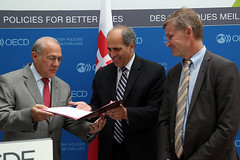Examens par les pairs des membres du CAD
Signing Ceremony for the Accession of the Slovak Republic to the Development Assistance Committee
Ceremonial Remarks by Angel Gurría, OECD Secretary-General
Paris, France, 17 September 2013
Dear Minister, Dear Ambassador, Ladies and Gentlemen,
| It is my pleasure to be here with you today as the Slovak Republic accepts the invitation to join the OECD’s Development Assistance Committee (DAC). It is both impressive and inspiring to see how far Slovakia has come. Prior to 2004, the Slovak Republic was eligible to receive development assistance, now, in less than a decade; it is becoming a provider of development co-operation. Over the last ten years, the Slovak Republic has made remarkable progress to create a development co-operation system. This country has established a solid institutional framework for managing its aid and has almost tripled its volume of official development assistance since its accession to the European Union in 2004. In addition, Slovakia has generously shared its transition experience with the Balkans and Eastern Europe. |
 |
Its unique transition experience will also be of great value to the DAC’s continued efforts to advance the aid effectiveness agenda. Slovakia’s perspective on creating institutions to support an efficient market economy and on combining development, good governance and democracy will be highly useful for developing and transition countries. These inputs will also be of great value as DAC builds upon its work on the Millennium Development Goals (MDG) to help shape a new development architecture for the post-2015 period.
DAC has made great progress on this front by working more collaboratively with individual committees at the OECD. Working together on issues such as investment and development, illicit flows, green growth and development policy coherence, helps to break down the silos between “development” and “non-development” policies and create a more cohesive, effective approach to aid.
By participating in these processes, in peer reviews and in statistical reporting, Slovakia will also broaden the scope of its influence on the development agenda. By joining the DAC, Slovakia will also benefit by increasing its international credibility and visibility as a provider of development co-operation.
These well recognized advantages are attracting a flock of countries. This year we have also been pleased to welcome Iceland and the Czech Republic to the DAC, and we are looking forward to their active membership and involvement.
I hope very much that, by December, Poland and Slovenia will also have joined the DAC. Our goal is that all OECD countries, present and future, will become DAC members. Therefore, I seize this opportunity to encourage the remaining members of the Organisation that have not done so already to give very serious political consideration to joining the DAC. We will support this process in any way we can.
Minister, Dear Ambassador, the exhibit you are opening today demonstrates Slovakia’s remarkable contributions to development over the past ten years – and I would like to thank you for these efforts. These initiatives, and Slovakia’s own experiences, lay the foundation for a fruitful and longstanding partnership between the OECD and the Slovak Republic.
I look forward to seeing this promising relationship blossom and to the powerful impact it will have on increasing the effectiveness of the aid agenda. I now invite the DAC Chair, Erik Solheim, to formally sign a letter inviting the Slovak Republic to join the DAC. Thank you.
Documents connexes